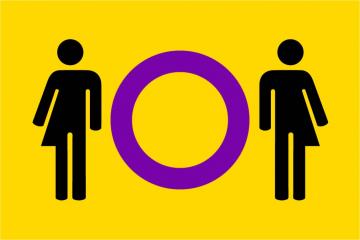The rights of intersex people are too often overlooked

The results, presented in a new FRA Focus paper, show that there is a need to review laws and practices across the EU that can result in discrimination, and violations to the physical and psychological integrity of intersex people especially when young.
“The rights of intersex people have been largely overlooked by policy makers and legislators across the EU over the years,” says FRA interim Director Constantinos Manolopoulos. “FRA’s work points to some of the urgent challenges that need addressing to break down the discriminatory barriers that persist and to alleviate the unnecessary suffering from medical interventions.”
The paper examines the situation of intersex people from a fundamental rights perspective. Intersex people vary in their chromosomal, hormonal and/or anatomical characteristics which do not match strict medical definitions of male or female.
To date, intersex issues have been largely treated medically. However, at both EU and national level institutions and civil society are beginning to be more aware of the fundamental rights implications. This paper focuses on three of these issues:
Registration of sex at birth: Many Member States legally require births to be certified and registered as male or female. This puts pressure on those concerned with registration, particularly parents and health professionals to choose the sex of the new-born child and to intervene medically. However, at least four Member States allow birth certificates to be registered as sex neutral and two allow birth certificates to be issued without a sex identifier. Gender markers in identity documents and birth registries should therefore be reviewed to better protect intersex people.
Medical treatment of intersex children: In at least 21 Member States, medical interventions are carried out on intersex children to impose a sex on them. In 8, legal representatives can give consent and 18 require patient consent. However, involving children in such decisions is a grey area as factors such as age determine when the child can decide, when parents should decide and opens up the question what happens when there are disagreements between the intersex child and parents over the decisions made. It should also be noted that non-medically essential surgery without consent is viewed by international law as inhumane, cruel and degrading. Member States should therefore avoid non-consensual ‘sex-normalising’ medical treatments for intersex people.
Protection from discrimination: Intersex discrimination is better covered by sex discrimination rather than discrimination on the basis of sexual orientation and/or gender identity as it is the determination of the sex that gives rise to inequalities. Given intersex covers a large variation of sex characteristics, cases will probably be approached differently, even within the same legal system, in the absence of specific protective legislation. Legal and medical professionals should therefore be made aware of the fundamental rights of intersex people, particularly children.
The paper draws on evidence from FRA’s third update of its comparative legal report on homophobia, transphobia, and discrimination on grounds of sexual orientation, gender identity and now covers intersex. The update is based on data collected until mid-2014 across the EU and will be published later this year.
To read the Focus paper, see: The fundamental rights situation of intersex people.
For further information please contact: media@fra.europa.eu Tel.: +43 1 580 30 642
Notes to editors:
- FRA will present the Focus paper during the IDAHO Forum 2015 in Montenegro on 12 May at an event entitled ‘Human rights of intersex people: challenges ahead’. This event is co-organised with the Office of the Council of Europe’s Commissioner for Human Rights which will launch the Issue Paper ‘Human rights and intersex people’.
- FRA has conducted socio-legal research since 2007 on the fundamental rights of LGBT people. See FRA’s LGBT web section for more information.
- The European Union Agency for Fundamental Rights (FRA) provides evidence-based advice to EU and national decision makers, thereby contributing to more informed and better targeted debates and policies on fundamental rights.